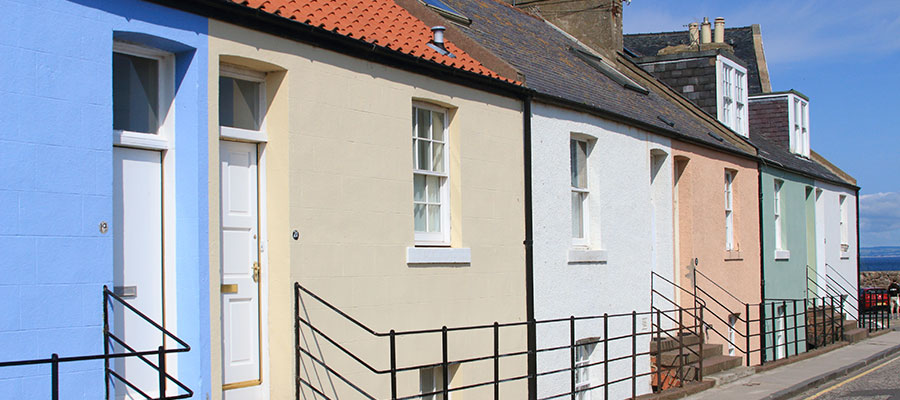Scottish stamp duty holiday: How did LBTT change and when did it end?
Following the announcement of a “Stamp Duty holiday” in England and Northern Ireland, the Scottish Government confirmed that they would be temporarily raising the nil LBTT threshold from £145,000 to £250,000 on 15th July 2020. However, this "LBTT holiday" came to an end in Scotland on 31st March, meaning the zero tax threshold has dropped from £250,000 back to £145,000. First time buyers will benefit from a nil tax threshold of £175,000, as they did prior to the 15th July 2020.
Rishi Sunak, UK Chancellor of the Exchequer, announced an extension of the “Stamp Duty holiday" in England and Northern Ireland from the end of March until the end of June in his Budget announcement on 3rd March. However, this would not apply to Scotland - the LBTT reduction ended on 31st March as planned.
In this article, we answer commonly asked questions about LBTT and investigate what this change means for you.

What is LBTT?
Land and Building Transaction Tax (LBTT) is Scotland’s version of stamp duty. This property tax is applied to residential and commercial property purchases in Scotland.
How much is LBTT in Scotland?
The amount of LBTT paid on a residential property transaction depends on the property selling price. There are various LBTT bands, with a different percentage of tax applied to each band.
In July 2020, the Scottish Government raised the nil tax threshold from £145,000 to £250,000 for residential property transactions but all the percentages for the other bands remained the same. The table below shows how much LBTT was payable on residential property transactions for the different bands, both before and after 15th July 2020.
LBTT bands reverted to what they were prior to 15th July 2020 after 31st March 2021 (with first time buyer relief up to £175,000). You can also use our LBTT calculator to find out how much you'll need to pay based on the property price.
| LBTT band | Transactions before 15th July 2020 and after 31st March 2021 | Transactions between 15th July 2020 and 31st March 2021 |
| Up to £145,000 | 0% | 0% |
| £145,000 - £250,000 | 2% | 0% |
| £250,001 - £325,000 | 5% | 5% |
| £325,001 - £750,000 | 10% | 10% |
| Over £750,000 | 12% | 12% |
How much more LBTT will I have to pay now that I'm purchasing after 31st March 2021?
The change to LBTT on 15th July 2020 meant anyone purchasing a property under £250,000 didn't have to pay LBTT, unless it was a second home in which case the 4% Additional Dwelling Supplement applies.
Those who purchased a property over £250,000 after 15th July 2020, only paid LBTT on the amount over £250,000. Raising the 0% threshold from £145,000 to £250,000 meant people purchasing a property over £250,000 saved up to £2,100 on LBTT.
As the LBTT reduction came to an end on 31st March 2021, from 1st April the zero tax threshold dropped back to £145,000 meaning buyers will have to pay up to £2,100 more for a property purchase, in comparison to those who bought during the LBTT holiday. However, first time buyers will benefit from tax relief up to £175,000, saving them up to £600 compared to other buyers. This means they will only have to pay up to an extra £1,500.
I’m a first time buyer – how does the change in LBTT affect me?
Prior to the 15th July 2020, first time buyers benefited from 0% LBTT up to £175,000 as opposed to £145,000. This meant they could save an additional £600 compared to other buyers
When the LBTT holiday was in place, first time buyers (along with all other buyers) benefited from a higher nil tax threshold of £250,000. This meant first time buyers could save up to an extra £1,500 on LBTT on property purchases from 15th July 2020 to 31st March 2021.
However, this LBTT reduction came to an end on 31st March 2021 as planned. After this date, first time buyers will still benefit from a zero tax threshold of £175,000 instead of £145,000, saving them up to £600 on property purchases compared to other buyers.
What about the Additional Dwelling Supplement?
The Additional Dwelling Supplement (ADS) is a 4% surcharge which applies to second home purchases. This charge still applied on transactions between 15th July 2020 and 31st March 2021, and continues to apply now that the LBTT holiday has come to an end.
This means if you are purchasing a residential property and already own a home, you will be required to pay the 4% ADS charge.
If you are planning to sell your original property, you can claim the ADS amount back provided you sell within 18 months.
Find out more
As the home of property, ESPC is with you every step of the way for your next home move – get free advice from one of our property experts to get started.